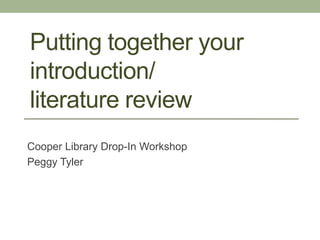Introduction and literature review
•Als PPTX, PDF herunterladen•
1 gefällt mir•1,040 views
Melden
Teilen
Melden
Teilen

Empfohlen
Empfohlen
Weitere ähnliche Inhalte
Ähnlich wie Introduction and literature review
Ähnlich wie Introduction and literature review (20)
PSY 326 Research Methods Week 3 GuidanceWelcome to Week 3 of Res.docx

PSY 326 Research Methods Week 3 GuidanceWelcome to Week 3 of Res.docx
Academic writing workshop series 1 2016 seminar 2 lit reviews

Academic writing workshop series 1 2016 seminar 2 lit reviews
Ug dissertations writing up your findings and discussion

Ug dissertations writing up your findings and discussion
Ug dissertations writing up your findings and discussion

Ug dissertations writing up your findings and discussion
1 Recognizing Assignment Expectations Implied by Key Ver.docx

1 Recognizing Assignment Expectations Implied by Key Ver.docx
1 Recognizing Assignment Expectations Implied by Key Ver.docx

1 Recognizing Assignment Expectations Implied by Key Ver.docx
What is Critical ThinkingThe head of your organization pulled you.docx

What is Critical ThinkingThe head of your organization pulled you.docx
Writing-a-Literature-Review-in-Psychology-and-Other-Majors.pptx

Writing-a-Literature-Review-in-Psychology-and-Other-Majors.pptx
Writing-a-Literature-Review-in-Psychology-and-Other-Majors.ppt

Writing-a-Literature-Review-in-Psychology-and-Other-Majors.ppt
Introduction and literature review
- 1. Putting together your introduction/ literature review Cooper Library Drop-In Workshop Peggy Tyler
- 2. Your introduction is: • To tell the reader what problem you attempting to address or what are you trying to find out • To say why it is important that this issue or problem is investigated • To preview your hypothesis - what do you think is going on • To briefly highlight the benefits of your study
- 3. Your literature review is: A summary of relevant previous works.
- 4. Why? To establish your work as a link in the chain of research that is advancing knowledge in your discipline To show that you are basing your hypothesis on the previous work of experts in that subject To show that you know both the most significant and the most up-to-date literature relevant to your topic To establish that your research question is important To provide the reader with information from other sources that they will need to understand your study.
- 5. • Used in scholarly papers OR • in theses and dissertations
- 6. Driver fatigue Definitions/history of relevant research/ costs Eye tracking research primarily in vehicles Driver Warning Systems (DWS) DWS fatigue DWS using eye tracking DWS fatigue using eye The Literature Review tracking as a Funnel
- 7. But the key is deciding on your headings and sorting your articles into folders for each heading: Biological Kudzu history Herbicide control control
- 8. Author vs. information Which is more important – the author or the information? • AUTHOR • Liberman, Sagristano, and Trope (2002) found that people predicted more accurately mixed emotions for near-future events, but used more basic (and inaccurate) forecasts of affect for far- future events. • INFORMATION • Another mistake that people make in predicting their future emotions is overestimating the intensity of their reactions to situation or event. This bias was best shown in a study where students were asked to predict how they would feel the moment they learned their final grade in their psychology class, on Christmas day, and other events in their lives (Buehler & McFarland, 2001).
- 9. Choosing Verbs You are summarizing the work of others AND expressing your opinion. Smith and Jones ____ Accounted for Focused on Rejected Acknowledged Held the view Remarked Argued Insisted Stressed Assumed Maintained Suggested Challenged Noted Supported Claimed Observed Took for granted Contended Pointed out Underlined Disputed Proposed Drew attention to Proved Shift-F7 is your friend! Emphasized Recognized Established Recommended From: http://www.monash.edu.au/lls/llonline/writing/ general/lit-reviews/3.4.xml Found Reiterated
- 10. Conclusion Usually the conclusion of your literature review is your “now-inevitable” thesis statement or hypothesis: • Based on this previous research, it is important to more closely examine the role of peers in the college selection process. • In general, studies have compared driving behavior of different drivers in terms of aggregate measures. In this dissertation, an attempt was made to compare driving behavior on a micro-scale (second-by-second) level.
- 11. Finding help Look at exemplars Undergraduate research journals Dissertations and theses Style manuals Useful e-books Getting it right : the essential elements of a dissertation McGraw-Hill's concise guide to writing research papers Writing for science and engineering
